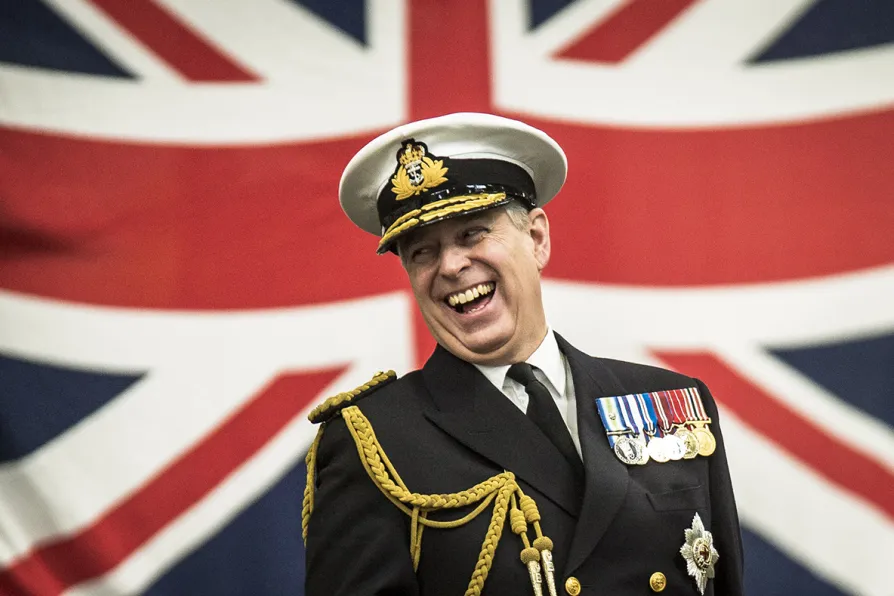
 Andrew ‘The Duke of York’ Windsor laughs during a visit to Royal Naval Air Station Yeovilton, Somerset, January 29, 2015
Andrew ‘The Duke of York’ Windsor laughs during a visit to Royal Naval Air Station Yeovilton, Somerset, January 29, 2015
NEWSPAPERS love a royal scandal, but the issues raised by the Prince Andrew saga run deeper. We cannot risk confining this to the moral depravity of a single prince.
The royal playbook is one of obfuscation and cover-up: the idea of Andrew Windsor facing real questioning over his alleged crimes is never addressed.
Like the reported £12 million settlement he agreed with the late Virginia Giuffre following her allegations that he abused her as a teenager (which he denies), no liability is acknowledged: yes, Andrew might “give up” his aristocratic titles, but only to avoid “distracting” from the rest of the family. He is to be pushed out of sight, out of mind, not required to face justice.
The government sticks to the convention that the royals are beyond democratic scrutiny: the case is a matter for the royal family. As campaigners Republic point out, this illustrates a basic problem with the monarchy, as an unaccountable institution at the apex of the British state.
Its secretive machinations mask more than the personal behaviour of its members. Through the royal prerogative, the state can avoid parliamentary oversight of important decisions (including military action, something Keir Starmer once promised to change).
The monarchy should go. But it is not royal exceptionalism but the parallels with the secrecy, victim-blaming and lack of accountability across politics and the state that is most alarming.
Emails published by the Mail on Sunday suggesting the prince asked his close protection officer to dig up dirt on Giuffre, shortly before the infamous photograph appearing to show him with his arm around her in the company of Jeffrey Epstein’s partner Ghislaine Maxwell was first published, fit a recognisable victim-smearing pattern (though in this case it is not suggested that the officer complied).
There are clear echoes of the way the Met spread disinformation about Brazilian electrician Jean-Charles de Menezes after it shot him dead, trashing the character of an innocent man to mitigate its guilt. Or — as revealed in the ongoing spycops inquiry — the way it snooped on the family of murder victim Stephen Lawrence, hoping to discredit those campaigning for justice and against its own institutional racism.
The approach — cover up wrongdoing, spy on and smear your accusers and victims — is too well attested across different arms of the state for this to be put down to a maverick royal.
And the government’s obvious indifference to the crimes of the Epstein circle — it shows no desire to get to the bottom of the claims against Prince Andrew, and tried to defend another Epstein associate, Peter Mandelson, as ambassador to the United States long after it was aware of how close their relationship was — will hardly give confidence to other victims of trafficking or abuse.
That’s something ministers should be aware of after two abuse survivors quit its inquiry into grooming gangs this week, one charging that it was “less about the truth and more about a cover-up.”
Which could be said of almost everything to do with Jeffrey Epstein, from his convenient “suicide” to the tortuous and contested release of “Epstein files” by the US government. The scandal is huge, and touches people far more powerful than Mandelson or Andrew Windsor: Giuffre first encountered the billionaire paedophile at Donald Trump’s Mar-a-Lago club.
But this only underlines how important it is that the sordid nexus of money and power, drawing in some of the most powerful men on the planet, is properly investigated and exposed.
We owe that to victims past and present. Giuffre, it should be remembered, died by suicide this year, unable to heal from the appalling wrongs done to her as a child and adolescent.
Andrew is a buffoon, whose Newsnight interview on his links to her has long been the subject of ridicule: but the questions at the heart of this affair are no laughing matter.










